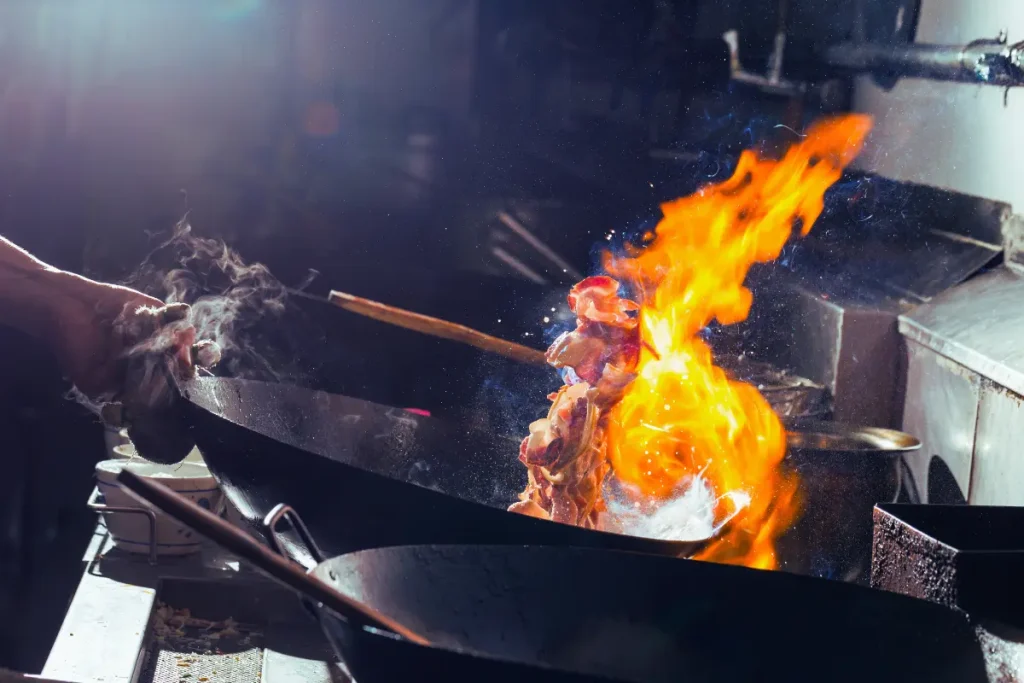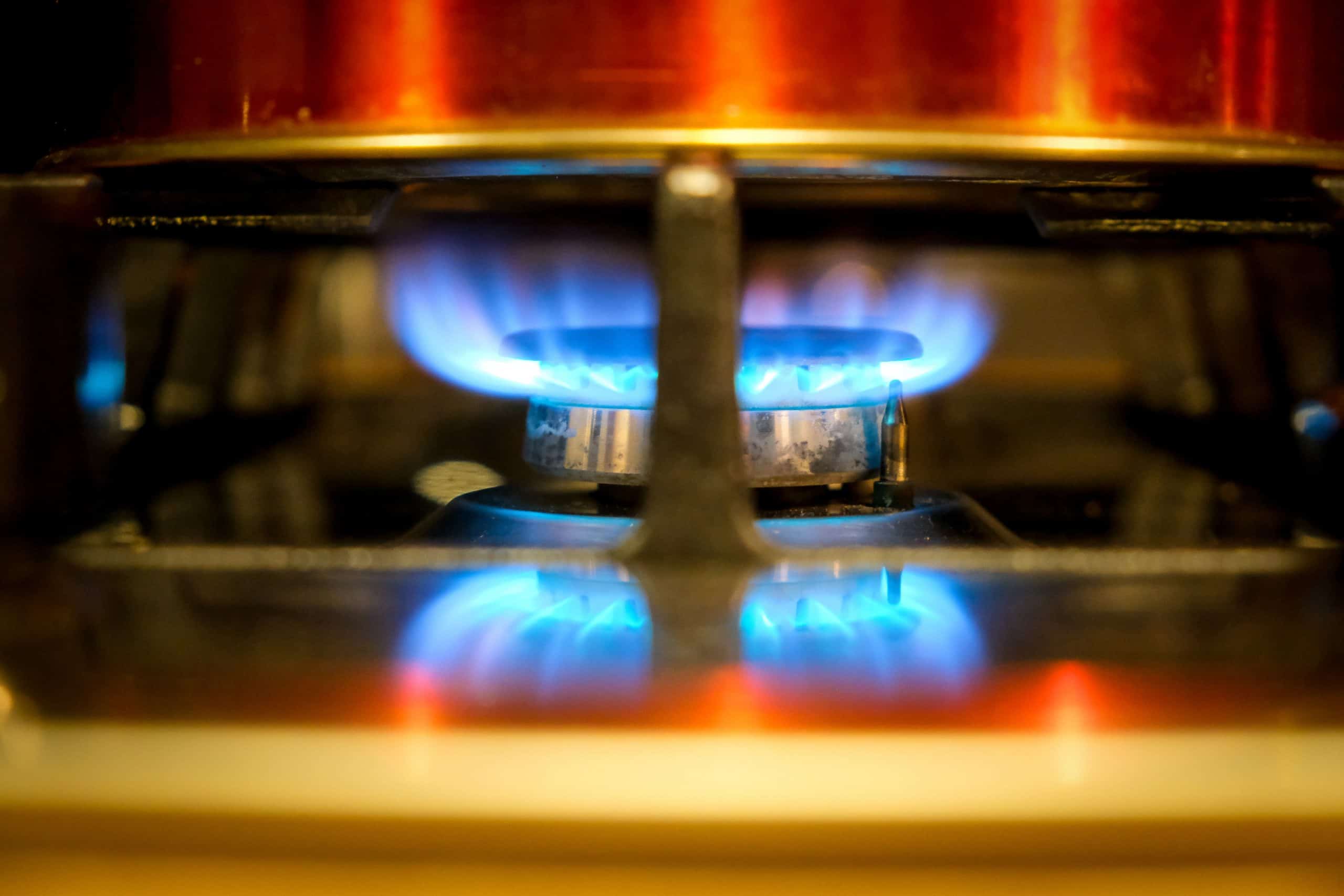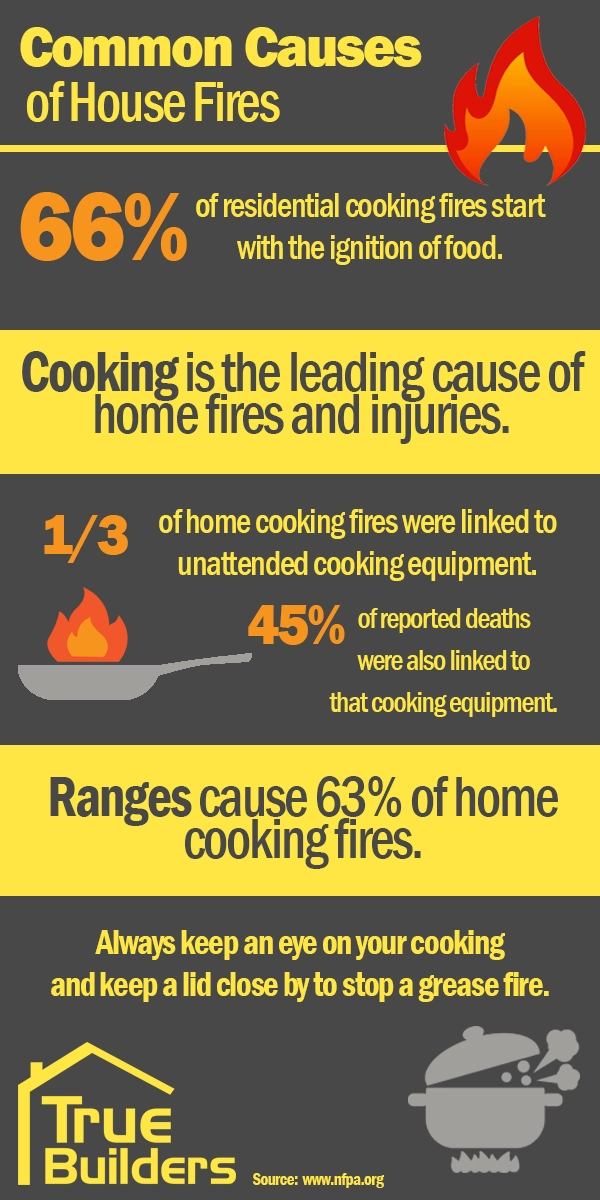Cooking is enjoyable, but it has risks. Kitchen fires are a common hazard.
Understanding what usually causes kitchen fires is crucial for safety. Many people don’t realize how quickly a minor mistake can lead to a dangerous situation. Grease buildup, unattended cooking, and faulty appliances are a few culprits. Each kitchen has potential hazards that can ignite a fire.
Recognizing these risks helps prevent them. Knowing the causes of kitchen fires can save lives and property whether you are a seasoned chef or a beginner. Let’s examine the key factors that often lead to these dangerous incidents and learn how to avoid them. Safety in the kitchen starts with awareness and good habits.
Common Causes
The kitchen is often the heart of the home but also a common place for fires to start. Understanding what usually causes kitchen fires is essential for safety. Below, we’ll explore some common causes.

Cooking Equipment
Cooking equipment, such as stovetops and ovens, is a leading cause of kitchen fires. Grease can build up and ignite, electric appliances overheat, and faulty wiring can spark flames.
- Grease Fires: Grease is flammable and can catch fire quickly.
- Overheated Appliances: Appliances like toasters and microwaves can overheat.
- Faulty Wiring: Faulty wiring in ovens and stovetops can cause sparks.
Unattended Cooking
Unattended cooking is another major cause of kitchen fires. Leaving the stove or oven on without supervision is risky. Distractions lead to forgotten cooking tasks.
- Distractions: Phone calls, TV, or children can divert attention.
- Leaving the House: Forgetting to turn off appliances before leaving.
- Napping: Falling asleep while cooking can be dangerous.
Always stay in the kitchen while cooking. If you need to leave, turn off the heat.
| Cause | Reason |
|---|---|
| Grease Fires | Grease ignites quickly |
| Overheated Appliances | Appliances can overheat and catch fire |
| Faulty Wiring | Wiring can cause sparks |
| Distractions | Attention is diverted |
| Leaving the House | Appliances left on |
| Napping | Falling asleep while cooking |

Credit: www.american-apartment-owners-association.org
Electrical Issues
Electrical issues are a common cause of kitchen fires. Many kitchens have appliances that require high electricity usage. This can lead to dangerous situations if the electrical system is not up to standard. Understanding the main causes related to electrical issues can help prevent fires.
Faulty Wiring
Faulty wiring is a significant cause of kitchen fires. Over time, wires can become damaged or frayed. This can result in sparks that ignite nearby flammable materials.
Signs of faulty wiring include:
- Flickering lights
- Burning smells
- Hot outlets
If these signs are present, it is crucial to have a qualified electrician inspect your wiring. Preventing faulty wiring issues can significantly reduce the risk of kitchen fires.
Overloaded Circuits
Overloaded circuits occur when too many appliances draw power from a single outlet. This can cause the circuit to overheat and potentially start a fire.
Common signs of overloaded circuits include:
- Frequent tripping of circuit breakers
- Buzzing sounds from outlets or switches
- Scorch marks on outlets
To prevent overloaded circuits, follow these tips:
- Distribute appliances evenly across different outlets
- Use power strips with surge protection
- Ensure your electrical panel can handle the load
Maintaining proper electrical safety practices is essential in avoiding kitchen fires. Regularly check your wiring and circuits to ensure they are in good condition.
Grease Buildup
Grease buildup is a common cause of kitchen fires. Grease collects over time and becomes highly flammable. This buildup can occur in different places in your kitchen. Regular cleaning can prevent dangerous situations.
Hood And Ventilation
The hood and ventilation system in your kitchen can trap grease. This grease collects from the smoke and steam while you cook. Over time, it builds up. This buildup can catch fire easily. Clean your hood and vents often. It keeps your kitchen safe.
Stovetop Residue
Grease on your stovetop is dangerous. It can come from spills or splatters while cooking. This residue dries and becomes sticky. If it catches fire, it spreads quickly. Wipe down your stovetop after each use. It helps prevent fires.

Credit: www.true-builders.com
Flammable Materials
Flammable materials in the kitchen can turn a pleasant cooking session into a dangerous situation. Many everyday items are highly flammable and can easily catch fire. Awareness of these items can help prevent kitchen fires and keep your home safe.
Loose Clothing
Loose clothing is a hidden danger in the kitchen. Long sleeves or flowing fabric can brush against hot surfaces. This contact can ignite the material quickly. Always wear fitted clothing while cooking to reduce the risk.
Kitchen Towels
Kitchen towels are often left near stoves or ovens. This habit can be risky. Towels can catch fire if they come too close to heat sources. Use towels mindfully and keep them away from open flames and hot surfaces.
Appliance Malfunction
Appliance malfunctions are one of the leading causes of kitchen fires. Even the best appliances can fail sometimes. This can lead to dangerous situations. Here, we will look at two common culprits: ovens and microwaves.
Defective Ovens
A defective oven can be a ticking time bomb. Ovens have many components. Each one needs to work perfectly. If one part fails, it can lead to a fire.
For instance, a broken thermostat may cause the oven to overheat. Wiring issues can also spark a fire. Regular maintenance is key to preventing these problems. Check your oven’s manual for tips on upkeep.
Some signs of a malfunctioning oven include:
- Strange smells
- Unusual noises
- Inconsistent temperatures
Faulty Microwaves
Faulty microwaves are another common cause of kitchen fires. Microwaves use high voltage to cook food. This makes them dangerous if they malfunction.
One common issue is faulty door seals. If the door does not close properly, heat can escape. This can cause nearby items to catch fire. Sparks or arcing inside the microwave are other warning signs.
To keep your microwave safe:
- Clean it regularly
- Inspect the door seal
- Do not use metal containers
Being aware of these issues can help you prevent kitchen fires. Stay vigilant and perform regular checks on your appliances.
Open Flames
Open flames in the kitchen can be dangerous. They are one of the most common causes of kitchen fires. Understanding how these fires start can help keep your kitchen safe. Let’s look at two main sources of open flames: gas stoves and candles.
Gas Stoves
Gas stoves are popular for cooking. They use an open flame to heat food. But, they can also be risky. Here are some common causes of fires from gas stoves:
- Unattended cooking: Leaving food cooking on the stove can lead to fires.
- Grease buildup: Grease can catch fire easily. Clean the stove regularly.
- Gas leaks: A leak can cause an explosion. Always check for leaks.
To stay safe, always watch your cooking. Clean the stove after use. Check for gas leaks often.
Candles
Candles add a cozy feel to the kitchen. But they also bring fire risk. Here are some tips to avoid candle fires:
- Place candles away from flammable items: Keep them away from curtains, towels, and paper.
- Never leave candles unattended: Always blow them out when you leave the room.
- Use sturdy holders: Make sure candles are in holders that won’t tip over.
Candles can be safe if used carefully. Always keep an eye on them and place them safely.
By understanding the dangers of open flames, you can prevent kitchen fires. Stay alert and follow these tips to keep your home safe.
Improper Storage
Improper storage in the kitchen can lead to dangerous fires. Many people overlook the risk of keeping flammable items close to heat sources. This can result in sudden and unexpected fires. Let’s explore some common storage mistakes.
Flammable Liquids
Flammable liquids like cooking oils and alcohol pose serious fire risks. Storing them near the stove or oven can be dangerous. A tiny spark or high heat can ignite these liquids. Always keep them in cool, dry places away from any heat source.
Paper Products
Paper products like napkins, towels, and cardboard can easily catch fire. Many people store them near the stove for convenience. This can be risky. Always store paper products in cabinets or drawers away from the stove.
Preventive Measures
Preventing kitchen fires is crucial for maintaining a safe home environment. Understanding preventive measures can significantly reduce the risk of such incidents. Let’s explore some key practices to keep your kitchen safe.
Regular Maintenance
Regular maintenance of kitchen appliances and equipment is essential. Ensure that all electrical appliances are in good working condition. Faulty appliances can spark fires.
Check your stove and oven regularly for gas leaks. A small leak can lead to a fire hazard. It is also essential to clean your exhaust hood and ducts. Grease buildup can ignite and cause a fire.
Here is a simple maintenance checklist to follow:
- Inspect appliances for any damage or wear.
- Clean exhaust hoods and filters.
- Check for gas leaks regularly.
- Replace worn-out cords and plugs.
Safe Cooking Practices
Safe cooking practices are critical in preventing kitchen fires. Never leave cooking food unattended. It only takes a moment for a fire to start.
Keep flammable items away from the stove. This includes dish towels, paper towels, and plastic items. Always turn pot handles inward to avoid accidental spills.
Follow these tips for safe cooking:
- Stay in the kitchen while cooking.
- Keep flammable items away from the stove.
- Use a timer to remind you of cooking tasks.
- Turn pot handles inward to prevent spills.
In case of a small grease fire, smother it with a lid or use a fire extinguisher. Never use water, as it can spread the fire.
| Safe Cooking Tips | Explanation |
|---|---|
| Stay in the kitchen | Prevents unattended cooking fires |
| Keep flammables away | Reduces fire risk from nearby items |
| Use a timer | Helps keep track of cooking times |
| Turn pot handles inward | Prevents accidental spills |
Frequently Asked Questions
What Are Common Causes Of Kitchen Fires?
Common causes include unattended cooking, grease buildup, and electrical malfunctions. Always stay in the kitchen while cooking.
How Can Grease Cause Kitchen Fires?
Grease can overheat and ignite, causing a fire. Clean surfaces regularly to prevent grease buildup.
Can Faulty Appliances Lead To Kitchen Fires?
Yes, malfunctioning or old appliances can spark and cause fires. Regularly check and maintain kitchen appliances.
Are Microwave Ovens A Fire Hazard?
Microwaves can catch fire if misused. Avoid metal, aluminium foil, and overcooking food in the microwave.
Final Words
Kitchen fires are common but preventable. Stay attentive while cooking. Keep flammable items away from heat. Regularly check kitchen appliances for faults. Install a smoke detector. Avoid leaving food unattended on the stove. Clean grease buildup. Use proper cookware. Following these steps can keep your kitchen safe.
Remember, prevention is key. Stay safe and enjoy cooking!


